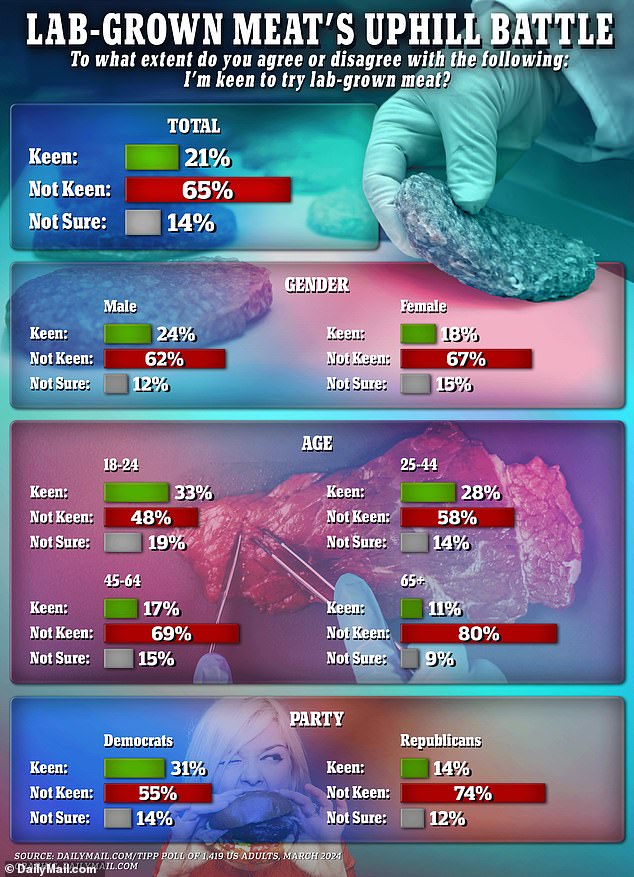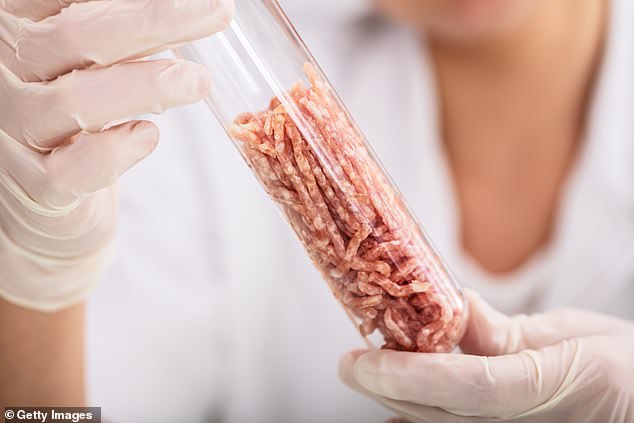It’s nutritious and doesn’t harm the planet, but lab-grown meat still has its problems.
In short: Americans just don’t want to put it on a fork and taste it.
That’s according to a DailyMail.com/TIP votingwhich found that only a fifth of voters were keen to try the cultured alternative to meat.
An overwhelming two-thirds of Americans say they’re not interested in trying it, and another 14 percent weren’t sure.

One of the 21 percent of people who were willing to give lab-grown meat the taste test


Our survey revealed strong opposition to a product that Republicans say will hurt ranchers and farmers
Our investigation comes as Republicans in several states are trying to ban the product, saying it will hurt ranchers, farmers and meatpackers.
Proponents say the produce is packed with protein and causes less emissions of global warming gases than conventional farming.
That makes lab-grown meat a new front in America’s culture wars.
Florida’s Republican-controlled House this month approved a far-reaching bill that would ban lab-grown meat.
The bill, which has yet to be signed by Gov. Ron DeSantis, would make it a second-degree misdemeanor to sell or manufacture lab-grown meat.
Similar legislation in Alabama and Arizona carries huge fines and even jail time for those who sell the products.
Still, lab-grown meat companies are optimistic that meat grown in massive steel vats will soon be widely available in restaurants and supermarkets.
Their product is derived from a small sample of cells collected from farm animals, which are then fed nutrients and grown in huge steel containers called bioreactors.


Proponents of lab-grown meat say it’s lean, safe, nutritious and doesn’t harm the planet
It is then processed into something that looks and tastes like a real piece of meat.
But the companies are struggling to offer their beef steaks and chicken breasts at a more affordable price.
Along the way, they must overcome a reluctance among some consumers to try lab-grown meat for themselves.
Our nationwide survey of 1,419 adults earlier this month shows that they have had their work interrupted.
An overwhelming 65 percent of respondents said they were not interested in trying lab-grown meat.
Only 21 percent of them said they would try it.
Opinions were similar throughout the country, although those in the West were slightly less hostile to the cultivated produce.
While a third of young adults were keen to taste lab-grown meat, only 11 per cent of those aged 65 and over felt the same way.
Men were slightly more likely than women to give it a shot, and blacks and Latinos were more keen on a dietary experiment than whites.


The product is derived from cells from farm animals, which are fed nutrients and grown in huge steel vats


Lab-grown meat: Not everyone is willing to give it a chance
There was also a partisan divide. A whopping 31 percent of Democrats were eager to try the product, compared to just 14 percent of Republicans.
Janet Tomiyama, a health psychologist at the University of California, Los Angeles, says people are getting consumed by cultured meat.
Some consumers see it as ‘unnatural’ and don’t want to try it, she told Reuters.
In a 2022 study published in the Journal of Environmental Psychology, she found that 35 percent of meat eaters and 55 percent of vegetarians would be too disgusted to try cultured meat.
Our survey suggests that attitudes towards the products are hardening.
It can be bad for the environment.
Growing meat in a steel vessel instead of in a field can reduce the environmental impact of livestock.
According to the UN’s Food and Agriculture Organization, livestock cause 14.5 percent of global warming gases through feed production, deforestation, manure management and ‘animal burps’.
